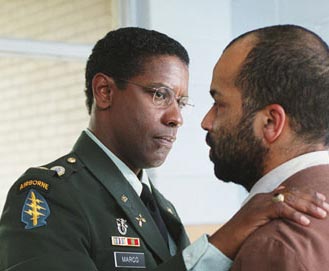 It takes director Jonathan Demme maybe ten minutes of The Manchurian Candidate to get to a close-up of his hero, Major Ben Marco, U.S. Army, using a lens so shallow that it reminds you of looking through an apartment door peephole. Of course, the point of distorting the handsome features of Denzel Washington, who plays Marco is to let us know that something psychotronically wrong is afoot, a point that’s reinforced when Demme uses the same lens on a former platoon mate of Marco’s, who has just accosted him with tales of a strange dream he’s been having over and over again.
It takes director Jonathan Demme maybe ten minutes of The Manchurian Candidate to get to a close-up of his hero, Major Ben Marco, U.S. Army, using a lens so shallow that it reminds you of looking through an apartment door peephole. Of course, the point of distorting the handsome features of Denzel Washington, who plays Marco is to let us know that something psychotronically wrong is afoot, a point that’s reinforced when Demme uses the same lens on a former platoon mate of Marco’s, who has just accosted him with tales of a strange dream he’s been having over and over again.
Thus we are confronted once again with the pile-driver technique of Demme, who once boasted one of the most sensitive touches in American cinema and whose documentaries still manifest an subtlety and patience. Since Silence of the Lambs, though, Demme has favored an all-out-assault approach in the totality of his work. For The Manchurian Candidate is not only a series of thriller hammer-blows – often, to be sure, cunningly applied – but it’s a work of (calculated?) political naiveté.
The plot is similar to the version of Richard Condon’s novel made in 1962 (and like that film, lacking Condon’s bleak humor) and directed by John Frankenheimer but, given the original’s Korean War references and period settings, updated.
Like his former comrade, Marco has been having a strange dream over and over again. Although full of undecipherable images – an Arab woman’s painted face looms large within it, for example – the dream has a forceful reality to it. At the same time, and again like his old army mate, Marco has been having doubts about one of the most important events in his life. Back in 1991, during the run-up to the war in Kuwait, he and his men had been ambushed during a reconnaissance mission. An explosion had knocked him out, but his sergeant, Raymond Shaw (Liev Schreiber) had taken command, beaten back the ambushers, and earned the Congressional Medal of Honor. Now Shaw, the scion of a wealthy political family and the son of conniving, bullying Senator Eleanor Shaw (Meryl Streep), is a two-term congressman angling for his party’s vice-presidential nomination.
The action takes place against a background of heightened warfare. Radios and televisions constantly blare news of battles involving American forces all around the globe. The Manchurian Corporation, a sinister fictional combination of the, OK, sinister real construction giant and military contractor Halliburton and the investment firm The Carlyle Group, has its grasping fingers deep in the national security pie and doles out money to politicians of both parties. Could Marco’s disturbing dream, Shaw’s political rise, and the Manchurian Corp. all somehow be related?
There’s never any doubt that they are and it’s a credit to Demme’s skill that, even with persistent overstatement, he’s able to wring suspense out of the material. It doesn’t last; by the time we get to the climax, the director’s quiver is empty, all his arrows shot in a series of blam-blam scenes that already reached high C. But for at least the first half, Demme is able to imbue the action with creepy chills.
Even looking nowhere but within the film itself, though, politically it makes no sense. The Manchurian Corp.’s ambitions are obviously to grab power by covert means – but why? As far as The Manchurian Candidate cares to show us, they already have it. Naturally, we’re supposed to be reminded that our current vice-president is the former head honcho of Halliburton and that the president is the son of a Carlyle director, but would a change in administration actually change anything aside from the stain of corruption? To paraphrase what the historian Richard Hofstader wrote about the administration of Grover Cleveland, what the Republicans give big business as a matter of corruption, the Democrats are willing to give them as a matter of principle. Halliburton’s rise was as smooth under Clinton as it has been under Bush. The fact that no one in the Clinton administration got greased and Cheney is still getting $600,000 a year from Halliburton is, in the end, an historical footnote.
The Manchurian Candidate wants to be a drama about democracy at risk, but it doesn’t want to include the basic element of democracy: people (or THE people, if you insist). Certainly the movie doesn’t go so far as to be anti-democratic; not at all. But it’s weird that Demme, who once made such exquisitely populist films as Melvin and Howard and Citizens Band, and who continues to make documentaries on populist subjects, could so carefully eliminate the popular voice from a movie about democracy.
